#jedi code
Explore tagged Tumblr posts
Text

#obikin#artwork#digital art#drawing#digital illustration#fantasy#star wars#anakin skywalker#obi wan kenobi#jedi code
234 notes
·
View notes
Text
There are no trash takes on Jedi philosophy, there is contextual analysis.
As may be obvious from the title (humorous--I have gone through several common misinterpretations myself), this is about that infamous scrap of poetry,
There is no emotion, there is peace. There is no ignorance, there is knowledge. There is no passion, there is serenity. There is no chaos, there is harmony. There is no death, there is the Force.
And the other version,
Emotion, yet peace. Ignorance, yet knowledge. Passion, yet serenity. Chaos, yet harmony. Death, yet the Force.
I've seen quite a few interpretations of these along the lines of "the second version is reasonable but the first version is crazy and stupid," so here's why I think both versions are actually communicating the same idea, and the wording doesn't really change the meaning much at all.
So just like I did in my post about "do or do not there is not try," let's start by asking some questions to establish context before we look at the text itself.
Is it THE Jedi Code or just a mantra? Legends says it's the Code, canon says it's a mantra. The fact of the matter is that no matter what, it's really a scrap of poetry which couldn't encompass the entire philosophical basis of a culture even if it was trying, so we'll consider it a mantra.
Does the fact that it's a mantra rather than THE Jedi Code mean that we can't get anything deep or meaningful out of it? Of course not. Just because it's not the whole of or a full explanation of Jedi philosophy doesn't mean it's just a nice sounding string of words.
Who is saying this to who? This mantra is often used to focus a meditation, with the first phrasing used by adults in the culture, while the second phrasing is more often used by children.
What were George Lucas' inspirations for Jedi culture that relate to this mantra? (borrowing from this post) A combination of christianity, buddhism, and his interpretations. I'm not an expert in any religion, and definitely not in buddhism, but I know enough to know I'm about to make some sweeping generalizations, so take this with a grain of salt. Disclaimers aside, this mantra, and the way it is phrased, indicate it is being inspired more by buddhism. The way christian texts, specifically the Bible, are written typically goes "here is a story about people doing something, and here is how big G god and/or Jesus reacted." There are metaphors sprinkled in, but they are mainly there to clarify for readers. Buddhist texts on the other hand (and lots of other eastern belief systems as well, like daoism, hinduism, etc. It's an important note that these belief systems don't necessarily conform to the western idea of what a religion is, and often their original languages don't even have a word which is equivalent in meaning to "religion") use metaphor in often deliberately contradictory ways, to make the reader think about things which are difficult to express in words alone. The ongoing struggle to reconcile contradictory descriptions is the point. This doesn't mean those texts can be interpreted however a reader would like. There may be multiple right interpretations, but there can also be wrong interpretations.
What the mantra does NOT mean:
"There is no ___ …" =/= "The experience of ___ is fake news."
"There is no ___ …" =/= "___ is not a useful concept."
"There is no ___ …" =/= "We should totally ignore ___ and pretend we've never heard that word before."
The mantra is not realy a set of advice on how to act. It's a set of statements about Existance. And I do mean capital E, philosophical, epistemological, weird, deep, think-y, Existence.
Temperature Metaphor
You know the first time someone tells you as a kid that cold isn't real, it's just the absence of heat and you're like… "but I'm touching something right now and it feels cold???" It sounds wild the first time you hear it, but as you think about it more, maybe learn about it a second time in science class, get some more context about how molecules work, etc. it begins to make more sense. It gets easier to grasp, until eventually the knowledge feels intuitive--especially if you're a STEM person who thinks about it a lot. We still talk about cold as a concept, because it's useful to us as well--lack of heat can have damaging effects on our bodies after all, and a cold drink is great on a hot day--and it's more efficient to say "cold" than it is to say "lack of heat." But there are some situations, like developing refrigeration or air conditioning, where it is not just useful but essential to think of temperature as it really is--heat exists, cold doesn't--and thinking of it colloquially can only hold us back (if this isn't actually intuitive to you, that's fine, it's just a metaphor--you could also think about dark being the absence of light, vacuum being the absence of mass, any number of things mirror this).
Probably the easiest like to get one's head around, imo at least, is "there is no ignorance, there is knowledge."
Taken hyper-literally it would mean "why seek out knowledge ever when everyone already knows everything?" But if we say knowledge is to heat as ignorance is to cold, then we can understand the real meaning--knowledge is real, where ignorance is only the name of an experience.
The Whole Mantra
This is the way the Jedi are understanding of emotion, ignorance, passion, chaos, death, etc. They are introduced, as children, to the idea that whilst they may feel all of these things, what they are actually experiencing is the lack of the other things--peace, knowledge, serenity, harmony, the Force. That's why they start with the "___ yet ___" phrasing--it introduces them to the first steps of understanding:
They can feel emotions, yet peace is still real and out there to reach for no matter how overwhelming those emotions may be at the moment,
They can feel ignorant or unknowledgeable, yet knowledge is out there to find,
They can experience passion (meaning suffering or pain in this context), yet know that serenity will return to them,
They can find their surroundings chaotic, and yet look for the harmony in the noise,
They can understand that death happens, yet be comforted by the fact that the person dying is still as much a part of the Force as they ever were.
Eventually they move onto the full mantra:
They will always feel emotions, but if they always reckon with those emotions and pass through them they can always return to a place of peace,
If they feel ignorant, they must seek out knowledge, rather than acting rashly. Also, their own knowledge is not the limit--others may hold knowledge in places they consider clouded,
They may experience suffering and pain--it may even feel like a good thing--but there is no wisdom in pain, it is the distraction from serenity, which is where truth can be found,
No matter how chaotic the world appears, it is actually a part of an underlying harmony that makes up all the patterns and the beauty in the world,
Death is not an ending, no matter how much it may look like one. It is a natural transition back into the Force, the place all life comes from.
A Jedi youngling is someone for whom this understanding is an essential part of the culture they are being brought up in.
A Jedi Padawan is someone who is beginning to learn to apply this understanding outside the confines of the Jedi temple, in a world where not everyone shares it.
A Jedi Knight is someone who has learned to apply this understanding on their own, without supervision.
A Jedi Master is someone for whom this understanding has become intuitive and automatic, no matter their surroundings.
All this is to say,
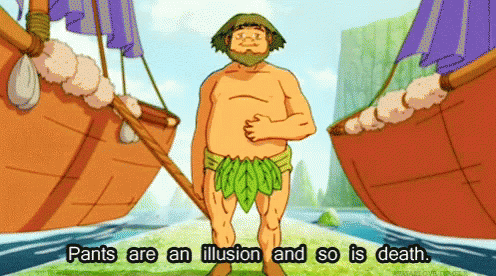
#star wars#jedi philosophy#jedi#jedi code#star wars prequels#jedi order#the force#star wars meta#me a star wars tumblr actually writing star wars meta?#it’s more likely than you think#long post#krayt meta
426 notes
·
View notes
Text
The Heart of a Jedi
It is a common belief in the galaxy that the Jedi are not permitted to love. Silently, some people mourn the children given to the Jedi, believing they will be brainwashed to hide their emotions and be unable to love. Disdainfully, some parents who don't wish to give their children to the Order claim that their children will never know love if they are taken in by the Order.
But love is a word with many connotations. How can a Jedi affirm or deny such accusations when they may be working with widely different definitions of the same word? When beings can mean any number of disparate emotions, many compatible with their way or life and many others contradictions of their code, values and vows?
The Jedi do not claim love is forbidden to them. How could they, with what love means to them? Saying love is allowed is misleading, and saying it's encouraged severely understates how important love is to them.
Love is essential, central to a Jedi's life. One cannot be a Jedi if they are devoid of love.
The Jedi do not claim that love is forbidden to them, as they share an ideal of kindness and compassion for all forms of life.



How could they strive towards this without love, as they understand it? Not affection, necessarily, for a Jedi must be compassionate even towards those they dislike. Rather, a deep respect for life, an attempt to understand it and its connections, and an endless drive to reduce suffering where they can.


That, to a Jedi, is love.
A Jedi must love everybody. They love the starving, the abused and the slaves of the galaxy, because they need their help. They love pirates, slavers, and corrupt politicians, when they dislike and want to stop them.
They even love the Sith.

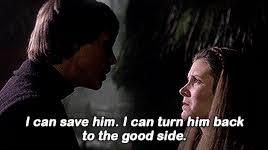
But for many beings in the galaxy, that is not enough. For many beings in the galaxy, that is not love. And as long as the Jedi reject the cruel thing the galaxy calls love, that grasps and steals and demands to own, long as the Jedi accept the inevitability of death, the futility of holding on to what is not meant to be held, there will be those that call the Jedi loveless.
How sad, a Jedi would say, to be unable to conceive love without cruelty.
#jedi appreciation#jedi code#love vs attachment#love without attachment#attachment isn't love#pro jedi#pro jedi order#jedi and clone troopers#jedi can and in fact SHOULD love#people just don't get love without possessiveness#and the Jedi aren't wrong in practicing non-attachment#If we define attachment like Star Wars does then I'd argue we all should let our attachments go#If my blog's name and the nature of the post and the previous tags didn't give you a clue…#i am completely and shamelessly pro jedi#and I will tolerate exactly zero anti jedi sentiments in my corner of the internet#the pictures were chosen deliberately btw#the Jedi are being kind and compassionate towards clones and droids (aka the least valued members of GFFA society)#I have more pictures where those came from but unfortunately this is supposed to be a short post and I've reached the picture limit#jedi positivity#in defense of the jedi#if the Jedi have no fans then I'm dead#star wars
179 notes
·
View notes
Text

The Jedi Code
#star wars#501st legion#clone wars#clone wars art#sw tcw#star wars the clone wars#art#illustration#the clone wars#galactic republic#drawing#sketch wars#anakin skywalker#tcw#ahsoka tano#fan art#my art#artwork#star wars tattoo#jedi order#jedi#the force#star wars fanart#jedi code#star wars tattoo design#yoda#obi wan kenobi
248 notes
·
View notes
Text
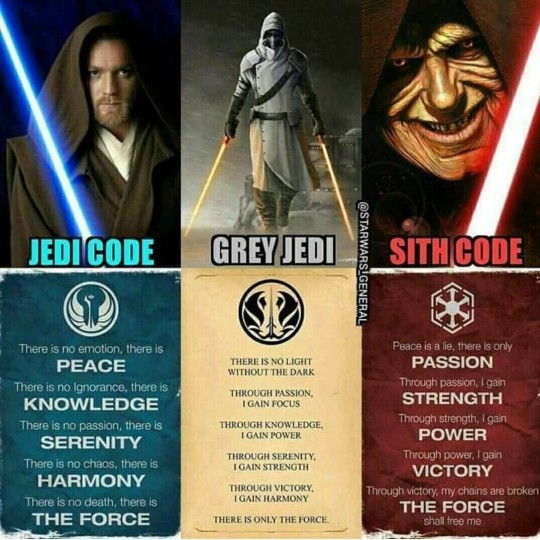
#star wars legends#star wars eu#the old republic#old republic#star wars#sw legends#sw eu#starwars#swotor#swtor#star wars au#star wars fic#starwars fanfic#star wars fanfiction#star wars shitpost#sw fic#sw philosophy#grey jedi#jedi code#sith code#sith lord#sith#sith pureblood#the jedi#jedi knight#star wars meta#sw meta#the force#sw prequels#jedi order
1K notes
·
View notes
Text
I’m gonna be honest. The more I think about it, the more I’m believing that the Star Wars Prequel Trilogy could’ve been better than the Original Trilogy if the script was tighter (a lot tighter). But George needed to let other people handle the script and he needed way more help with bringing his vision to life.
I mean, just think about it. The OG trilogy was a fairly straightforward, good vs evil storyline. Jedi and Rebels good, Emperor and Sith bad. Amazing storyline, but fairly simple. In comparison, the Prequel trilogy is far more complex in terms of what it was trying to achieve. If you look past the shitty dialogue and questionable storyline choices, the story that George came up with deals with:
1) Duty vs. Desire (Anakin trying to remain a Jedi but wanting to pursue Padme)
2) Questioning the Jedi Code instead of just blindly accepting it as gospel. Because despite how much Anakin was struggling with his complicated emotions, the Order doesn’t notice. In fact, the Order encouraged him to bury his emotions, which we see led to disaster since that led him right to the Dark Side.
3) An actual attempt at more complex politics rather than just evil empire versus good resistance. For example, it’s a meme that Anakin made an argument in favor of fascism, but in the hands of a better writer, that could’ve been a really good moment. We get an idea of why the Empire would have its supporters, despite being the obvious bad guys. It humanizes the Empire in a way that it doesn’t make you sympathize with them, but makes you understand how someone could end up on that path. That’s more true to life than just evil people being evil. (Andor is probably the one Star Wars media that understood this, which is partly why it’s one of the best Star Wars content out there)
4) The hero is genuinely a tragic character. He’s a child prodigy who was freed from slavery with the promise of a better life. But as he grows up, he becomes frustrated with how his life is turning out. He’s powerful, but not powerful enough to save his mom. He falls in love, but can’t be with Padme since it’s against the Jedi Code. Obi-Wan looks over him, but Anakin doesn’t feel he’s respected. The Order assigns him dangerous mission after dangerous mission, but he doesn’t get the rank of master. Anakin’s arc is about a man who feels like he’s not in control of his life (which is doubly sad when you remember he grew up in slavery) and, in his lowest moment, turns to a man who claims to be able to give Anakin everything he’s ever wanted. And that becomes his downfall since he ends up losing way more than he gained.
I’m sorry, but, that storyline is way more interesting than Luke and Leia’s story. No offense to Luke and Leia, but their dad’s story sounds like a Shakespearean tragedy. What messed it up was that George Lucas needed someone else to write the script.
#my thoughts#star wars#star wars prequels#star wars prequel trilogy#star wars original trilogy#george lucas#Jedi#the rebellion#galactic empire#emperor palpatine#sheev palpatine#anakin skywalker#darth vader#padme amidala#luke skywalker#leia organa#jedi code#jedi order#dark side#cassian andor#star wars andor#andor series#andor show#obi wan kenobi#ben kenobi#star wars thoughts
293 notes
·
View notes
Text
the reason obi wan is so oldest child is because he has the uncanny oldest child ability to turn his deepest darkest feelings into what sounds like a sarcastic joke
"Had you said the word, I would have left the Jedi Order." NOTHING WILL EVER CONVINCE ME THAT WAS JUST STALLING WTF
#why don't you just stab me in the heart obi wtf#it's so stupud jedi cant love ffs#jedi code#obi wan kenobi#obi wan star wars#duchess satine#obi wan x satine#clone wars#jedi#star wars prequels#star wars#star wars angst#angst
32 notes
·
View notes
Text
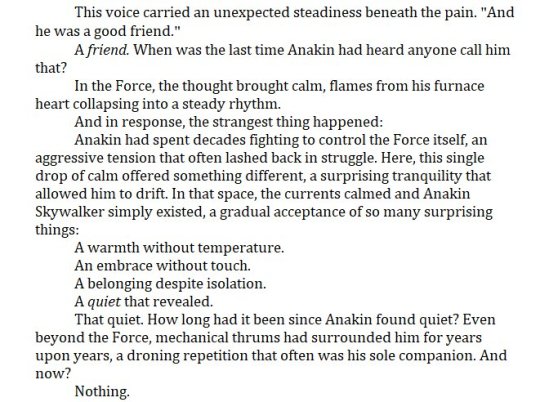
LET ME YELL ABOUT WHY I LOVED THIS MOMENT from Star Wars: From a Certain Point of View: Return of the Jedi | "Brotherhood". I have long argued that the "Jedi Code" is more of a meditation mantra, because almost every single time it comes up in supplementary material (it doesn't exist in the movies or TCW) it's used during a moment when a Jedi is trying to calm themselves down or meditate in the Force. And I have long argued that I don't think it's a literal guideline for how to live their lives, but instead a description of the Force. Because the prequels Jedi taught two different versions of the "Jedi Code": There is no emotion, there is peace. There is no ignorance, there is knowledge. There is no passion, there is serenity. There is no chaos, there is harmony. There is no death, there is the Force. Emotion, yet peace. Ignorance, yet knowledge. Passion, yet serenity. Chaos, yet harmony. Death, yet the Force. The second is from the Kanan comic, where Depa is leading a meditation with the younglings, while Obi-Wan and Mace and Yoda watch over them. So, if both of these versions are taught by the prequels Jedi, how can they both be applicable? Because they're not describing Jedi--they're describing the Force. They're describing what it's like to interact with the Force. That's why they use it as a meditation mantra! The Force itself has no emotion, it has no ignorance, it has peace. The Force has no passion, it has serenity. The Force has no chaos, it has harmony/ The Force has no death, it is the Force. Yet, when a Jedi interacts with it, they have emotion but they seek peace. They have ignorance yet they seek knowledge. They have passion yet they seek serenity. They have chaos yet they seek harmony. They have death yet they seek the Force, they become one with it when they die. Then this short story is about Anakin becoming one with the Force when he dies-- A warmth without temperature. An embrace without touch. A belonging despite isolation. A quiet that revealed. It's so evocative of the Jedi's description of the way they interact with the Force via the "Jedi Code"! It's the Force versus what you're bringing to the Force, it's about what a Jedi seeks in the Force--Anakin has no temperature, but he seeks warmth. Anakin has no touch, but he seeks an embrace. Anakin has isolation, but he seeks belonging. There is quiet in the Force. This is what the Force is, this is how the Jedi interact with it, they bring their own experiences to it and work to shed those things to find what they need in the Force, this is why the "Jedi Code" is structured the way it is and Anakin experiences that exact same thing when he steps into it. And I am legit emotional because I think of how much comfort and warmth and clarity the Force can bring when you let it move through you, when you let it embrace you, rather than trying to dominate it.
#lumi.txt#star wars#anakin skywalker#jedi order#jedi code#meta#novels#novels: from a certain point of view: return of the jedi
373 notes
·
View notes
Text
I want somebody to publish The Jedi Code For Dummies, and it's all just four lines:
- do no harm
- take no shit
- the force is your friend
- don't do drugs the dark side, kids
25 notes
·
View notes
Text
As an experiment, I decided to come up with a rewrite of the Jedi Code. The change is structural, not thematic, and I hope this version provides others some insight into Jedi philosophy.
The Force speaks, and a Jedi listens. A Jedi seeks peace beyond attachments. A Jedi seeks knowledge beyond ignorance. A Jedi seeks compassion beyond fear. A Jedi seeks harmony beyond chaos. A Jedi seeks hope beyond destruction. The Force is with me, and I am one with the Force.
My line of thought is that, first and foremost, the power of any Jedi is rooted in finding the most clarity between themselves and the Force. By listening to the Force, they can find the peace and knowledge they need in order to act out of compassion, harmony, and hope.
Second, I also was never a huge fan of the line "There is no emotion; there is peace." I understand what it means (not letting emotions rule your decison-making), but I never like how easy it is to misinterpret (i.e., Jedi can't have feelings ever). But when it comes to losing ourselves in our emotions, we're losing ourselves in attachment. Anakin chooses his fear of losing Padme over seeing through Sidious's lies. Dooku chooses his need for power and despair of the Jedi's future over standing up for his brethren or honoring his fallen former Padawan Qui-Gon. Even Luke gives into his anger in his final duel with Vader, overwhelmed by his need to save his friends at all costs and terrified of what might happen to Leia if he fails.
Third, I changed the line about "passion" versus "serenity" to focus more on compassion versus fear. I see it as a key point to follow the need for knowledge over ignorance, as ignorance can fuel fear, whereas the effort to learn more about others (and about oneself) can foster compassion in a Jedi's choices. The original line in the Code always seemed to me to be about developing good judgment in any situation, and so the reminder here is that a Jedi cares for others, even when faced with danger and uncertainty.
Fourth, I changed the original final line of the Code to refer to hope and destruction over "death" and "the Force." The Jedi represent hope to countless beings across the galaxy in almost every age of history (especially in the reign of the Empire). I thought it would work as a reminder to a Jedi who follows the Code that their ultimate goal is about preserving and defending life, not destroying the enemy no matter the cost. Whereas the Sith define victory by who they crush and how evident their power over others is, the Jedi see victory in the lives they save and the peace they bring to those who suffer. The rise of the dark side's power during the Clone Wars prevents the Jedi from fulfilling that latter duty since there's seemingly no end to the suffering and chaos spreading across the galaxy, so all they can do is lead the clone army and try to save as many lives as they can.
Finally, I just really, really like the mantra of the Guardians of the Whills, and it seemed like an attitude that they and the Jedi Knights have in common whether they can use the Force or not.
tl;dr I took a stab at rewriting the Jedi Code for clarity and for my own personal tastes.
41 notes
·
View notes
Text
thinking way too hard about this page from kanan: the last padawan and how much it shows about him as a character during rebels and also how that relates to ezra and their sacrifices at the end of the show
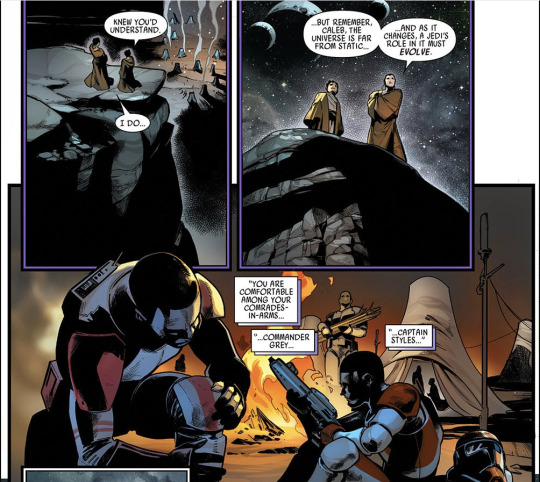
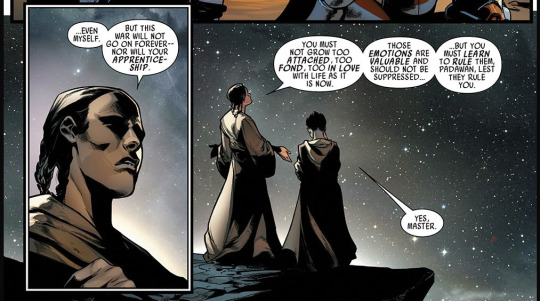
it's clear from the first episode of rebels that kanan has no qualms about attachment in general, which is a stark difference from most of the other jedi that we see. he cares freely and openly and deeply about all the members of the ghost crew. he might care too much at the beginning, but that's part of his journey as a jedi that we see throughout the show.
"you must not grow too attached, too fond, too in love with life as it is now" is a fundamental thing that kanan must remember during season 2 of rebels. because he DID become too attached to his life as it was with the ghost crew running around lothal, and when they join up with the larger rebel fleet, he doesn't like it and dislikes how things are changing. he has to relearn the ability to adapt and change before he's declared a jedi knight in season 2.
part of being a jedi is loving enough to know when it's time to go, which is something that kanan mastered. he and ezra leave at the end of season 2 to protect the rest of the rebellion, he teaches ezra to let sabine go with her family on mandalore, he helps hera reconcile with her past on ryloth. through love and attachment, kanan also learned sacrifice. he lost everything as he became kanan jarrus instead of caleb dume. he was forced to leave behind all the attachments of his former life in order to survive. he didn't learn to do that necessarily, he was forced into it out of necessity, which is very different than him consciously learning how to let go during rebels.
in rebels, kanan leaves by choice. in season 2, he knows that leaving is necessary to the survival of the rebellion. in season 4, he's standing on top of the fuel tank and holding back the explosion and he probably wants nothing more than to try and go with hera, ezra, and sabine. because that's his FAMILY. he loves them more than anything, but he knows that if he does not let go, they will not survive.
so he does. he sees them one last time, and then he lets them go and sacrifices himself to save them all, and in a way, this was the last lesson he ever taught ezra
its no secret that their sacrifices were meant to mirror each other, but here's the images again for reference

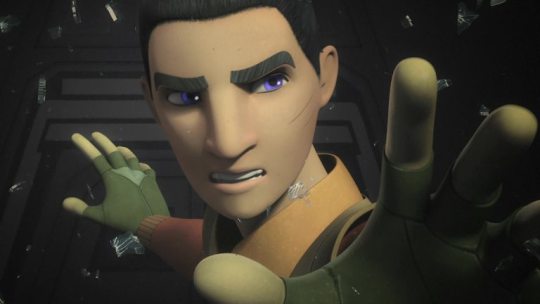
in his final moments, kanan teaches ezra about sacrifice. yes, you must love and feel and experience life, but to be a jedi knight, you must be able to master those feelings and do what you must for the greater good. in his actions, kanan was essentially repeating what depa told him when he was a padawan. "you must not grow too attached, too fond, too in love with life as it is now. those emotions are valuable and must not be surpressed, but you must learn to rule them lest they rule you". ezra fully learns that lesson during "the world between worlds" when he leaves the memory of kanan's death behind in the world between worlds and learns to stop his attachment from going too far.
and also like...kanan's life had FINALLY worked out when he died. hera just said that she loved him, they're back on lothal ready to free their home from the empire, he's figured out this whole jedi thing, and he may or may not know that hera is pregnant with their child depending on your interpretation. but he must let go. he cannot let his love and attachment stop him from doing what must be done for the greater good. he saves them, but he also leads to the empire blowing up their own fuel depot, which is the only reason the rebels can take back lothal. he put his purpose (saving the galaxy) over his feelings (because there was definitely a part of him screaming to go with his family, but he was able to control it in order to see the bigger picture)
the jedi fight for peace and the greater good, which at it's core requires immense selflessness and sacrifice and a clear head acting on logic rather than emotion. kanan and ezra were learning that together throughout the whole show, and one last time, kanan teaches ezra a jedi lesson that he finally figured out through trying to guide ezra through it
"but remember, caleb, the galaxy is far from static, and as it changes, a jedi's role in it too must evolve." jedi were keepers of the peace, then they were generals, then they were scattered teenagers who didn't know what to do in the wake of order 66, and now? now they are rebel fighters, once again getting at the heart of what it is to be a jedi. to be a jedi is to love, to sacrifice, to keep the peace. kanan and ezra show why jedi are KNIGHTS and not diplomats. they fight for peace, but they know it is just that: a bloody, brutal, violent fight, and that those fights require sacrifice in order to keep going. they both embody luthen's line from andor where he says "i burn my life for a sunrise i will never get to see", which is also a perfect way to think about why the jedi fight for peace. they really believe in it, and are willing to lay down their lives to make a peace that will never be achieved in their lifetimes.
(what's also crazy is that in this episode, we're essentially shown that kanan jarrus has found caleb dume again and therefore reconnected with his jedi past but that's a post for a whole other day)
i have so many feelings about this that basically boil down to: rebels is so well written and so underrated and kanan and ezra teach us far more about what the ideal jedi should be than any of the skywalker saga main characters (WHICH IS A VERY HOT TAKE I KNOW but it's my take)
#i am so normal about the shatterpoint lineage#and also kanan and ezra's sacrifices#totally and completely normal#star wars#star wars rebels#sw rebels#swr#kanan jarrus#caleb dume#ezra bridger#depa billaba#kanan: the last padawan#jedi knights#jedi code#i also love thinking about the jedi code#and how different characters interpret it#so maybe i'll post more things like this
84 notes
·
View notes
Text
Anakin loves Padme and she seems to love him back. However he overhears Clovis bragging about how he will marry Padme. Anakin can barely control himself from punching him. On the last night of body guarding he find a note from Padme. It says that she’s going to marry Clovis because she loves him and that Anakin needs to let her go. Anakin tries to desperately to speak to her at the party about it but she brushes him off saying they’ll talk afterwards. Anakin falls into despair and finds himself telling Obi Wan everything. He expects his master to be upset but he manages to comfort him and sends him back to the Jedi order. From then on Anakin is a perfect Jedi and conforms to the non attachment edict. A few years later when he has a padawan of his own and is on his way to being a master he sees Padme again. She is upset with him though he doesn’t know why. He acts cordial with her which only makes her more angry. She corners Anakin telling him he broke her heart by leaving her that night.
16 notes
·
View notes
Text
I recently went through a DBT program and I think I finally understand the idea of "attachment". As an ND, I feel my emotions intensely and always thought that my attachment and outpouring of love in my relationship was healthy attachment (spoiler alert: it was not).
Insecurity has always plagued me and was never more apparent than it was in my relationships. I would do WHATEVER it took to save a relationship because I was just so damn attached and afraid of losing what we had. In doing so I undermined myself, my own health, and our relationship, which only perpetuated my own self-loathing and insecure behaviors.
But there really is a balance between loving others AND loving yourself. I can both love and adore my partner and the joy we have in our relationship AND know that if things don't work out, I can still love myself, mourn for what I've lost, cherish what we had, and look forward to something new WITHOUT needing to feel like I should be trying to control his feelings, behaviors, or our relationship. Because I can't. And it's not my responsibility.
And that is a freeing thought.
It allows me to be fully present in our relationship, take care of myself, and support him in a way I wasn't doing before BECAUSE I was attached. I can enjoy our time together without worrying (or at least minimally worrying - I'm still a work in progress lol) or fearing that it'll all come to an end.
Not being attached doesn't mean I don't love him any less. It just allows me to show up and make the best of the time we have together.
I'm proud of how far I've come and wanted to share. I also just couldn't help but emphasize even more with Anakin. I didn't get to this place without some serious self-reflection, guidance, and persistentence which required me to directly face the things I didn't like about myself.
I couldn't have done that without a truly safe space to be myself and feel the things I felt without judgment.
Anakin didn't really have that luxury and had a literal Sith chirping in his ear working against him. That's not to say Anakin holds zero responsibility or accountability. I just empathize and understand better than I did before and it makes Stars Wars all the more poignant and beautiful for me.
#jedi#star wars#dbt#balance#mindfulness#jedi code#my rambles#wise mind#captain rex#anakin skywalker#obi wan kenobi#the bad batch#clone wars#anakin and padme#padme amidala
23 notes
·
View notes
Note
Hello ! Here's a Star Wars question. What's your opinion on "love isn't attachment" interpretation of the Jedi Code that has been going around?
Hey! Sorry it took me so long to answer this!
Short answer: Love and attachment often go hand in hand, however, they are NOT the same thing.
Long answer:
At the end of the day, this question hinges on how you define love, and what kind of love you are talking about. The English language is quite limited when it comes to love, because there are many different kinds love. (I've said it before, and I'll say it again, we need to bring back all the Ancient Greek words for all the different kinds of love, they were on to something.)
Love in general is not forbidden for Jedi, which means that there are at least SOME kinds of love that do not require attachment.
As Anakin puts it:
youtube
Compassion/agape/unconditional love is essential to being a Jedi. And this kind of love is not attachment. This kind of love expects nothing in return. This kind of love is never jealous, is never possessive, and does not hinge on ego or desire. This kind of love is not physical or sexual. There is no "I love you, I want you, I need you," and instead, there is self sacrifice, there is generosity, and it transcends personal desire.
HOWEVER.
When it comes to romantic love, there is always some aspect of attachment. This kind of love (when shared between two people) does come with expectation: I expect you to support me emotionally, I expect intimacy, I expect communication, I expect commitment, I expect loyalty, etc… (might sound demanding, but put it this way: would you be with someone who didn't care about your emotions? Who never wanted to be intimate with you? Who refused to communicate? Who refused to commit to you? Who cheated on you? I hope the answer is no because that would be very unhealthy).
Romantic love without attachment can come off as very cold, and uncaring. If your romantic partner said, "Hey, I love you so much, but if you left me for someone else or died, I would let you go and get over it and be fine, it's just the way of life," you might be slightly hurt.
Romantic love is deep, biological (not only in the sense of "it's for procreation" because it's so much more than that, and so much deeper, it fills a need for human companionship, friendship, someone you can trust beyond trust, someone to share everything with), and at its core, romantic love requires some level of attachment. It comes with all that "I LOVE YOU, I WANT YOU, I NEED YOU" passionate emotional insanity which is also inherently possessive. Romantic love requires an acknowledgment of the ego, it feeds the ego: I love you, AND you love me, and that feels great.
Romantic love centers around the self. Romantic love stems from what you want. (I'd never tell my sister, "On your next date, don't think about what you want or what you are looking for, think about what the guy wants and be selfless" because that is the worst dating advice ever.) Romantic love is inherently selfish- you want to end up with the person that makes you happy!
AND THAT IS NOT A BAD THING.
Unless you are a Jedi. (If you need a reason why, please just watch the Star Wars Prequels and you'll have your answer.)
IN CONCLUSION
Love is NOT attachment, however romantic love inherently comes with attachment.
Footnote: while attachment, possession, selfishness, and jealousy are all very normal of romantic love, every romantic relationship needs a balance. There are levels of possessiveness and selfishness and attachment that have to be worked out in every relationship and people have to find what levels of these things they are comfortable with. Not ALL manifestations of possessiveness in a romantic relationship is good/bad, etc. just clarifying.
#asks and answers#star wars#anakin skywalker#padmé amidala#padme amidala#love#jedi#jedi order#the jedi order#the jedi code#jedi code#attack of the clones#aotc#Star Wars aotc#sw aotc#Star Wars attack of the clones#Star Wars prequels#Darth Jess
33 notes
·
View notes
Text
How Ruby Ruined NNN for Jaune.
Jaune: There is no emotion, there is peace...
Ruby: Whatchu doing there Jaune. Can I join you? ☺
Jaune: There is no ignorance, there is knowledge...
Ruby: Oh Jaune. I'm presenting myself to you~
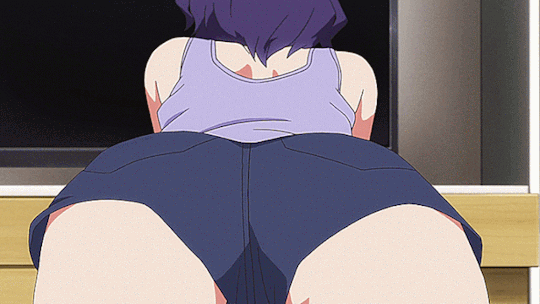
Jaune: there is no passion, there is serenity...
Ruby: But I'm feeling so very submissive and breedable right now~
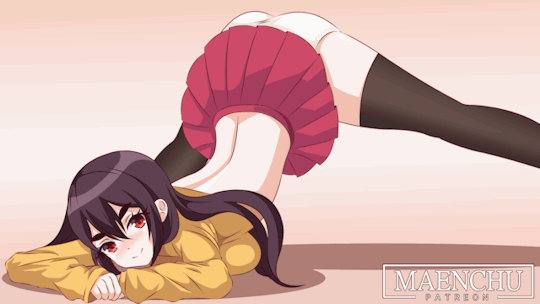
Jaune: There is no death there is only the... Oh there goes my trails of thoughts.
Ruby: You're welcome Jaune. 🥰
#rwby#jaune arc#ruby rose#lancaster#lancaster rwby#jaune x ruby#ruby x jaune#rwby lancaster#no nut november#jedi code
201 notes
·
View notes
Text
Lawyering through fandoms: Impossibility in contract law
When you become a Jedi, you have to give up all attachments as part of the Code. This includes romance as that is an attachment to your partner, which is why Anakin Skywalker kept his marriage to Padme Amidala a secret.
Under contract law, a party can raise an impossibility defense when an unforeseen event occurs after the contract is made which makes performance impossible. If this happens, impossibility can be used to excuse non-performance (basically, you don’t have to abide by the terms of the contract anymore).
Now, let’s say the Jedi Code is the contract you sign when you become a Jedi and the no-attachments rule is one of the terms. Well…Vader and the Empire destroyed the Jedi Order. Vader’s actions were unforeseeable since who the fuck expected Anakin to just wipe everyone out. Thus, we can say that anyone who signed up to be a Jedi no longer has to be bound by the Code since performance is impossible.
So, when this happens with Cal Kestis and Merrin:
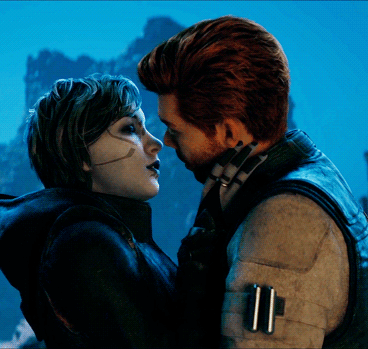
Cal is all good since he has an impossibility defense, just in case some Jedi veteran asshat sues him by claiming he’s gone against the Jedi Code. In fact, Cal even says that the Order is gone and he’s not bound to the Code anymore.
(There, I justified Merrical on a legal basis LOL)
#law#lawyer#lawyering#law school#star wars#star wars jedi survivor#star wars jedi fallen order#cal kestis#nightsister merrin#merrin#cal x merrin#cal kestis x merrin#calmerrin#merrical#star wars jfo#Star Wars js#jedi survivor#jedi fallen order#star wars humor#law stuff#star wars games#star wars ships#jedi order#jedi code#anakin skywalker#darth vader#padme amidala#star wars revenge of the sith#revenge of the sith#nightsisters of dathomir
101 notes
·
View notes